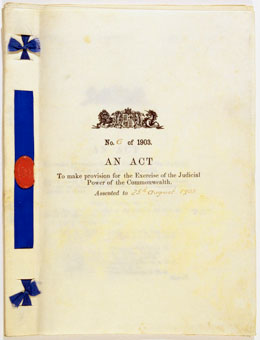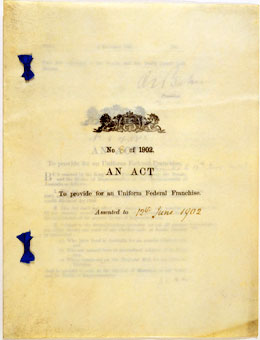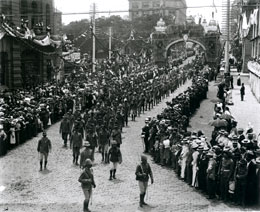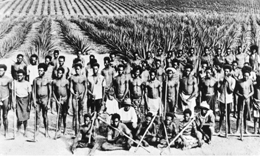Legislative program
The duty cast upon the first Parliament of the Commonwealth of putting into actual operation the intricate provisions of the Constitution has been discharged with ability, patience and patriotism. A complete record of your achievements touches most of the great problems that confront the people of Australia. You have faced their solution zealously, boldly, and with marked success.
Speech of the Governor-General, 22 October 1903, on prorogation of Parliament
A hard working Parliament
When the first national Parliament met in May 1901 some of the federal parliamentarians expected the workload to be low. One member even suggested that the federal Parliament would not need to meet for more than two months of each year.
During the first session of Parliament, the House of Representatives usually met from 2:30 from Tuesday to Thursday and sat into the evening, and between 10:30 am and 4:00 pm on Fridays. The Senate sat from Wednesday to Friday. The House Representatives sat in every week between 21 May and 13 December 1901, while the Senate adjourned only for one week in October. In all, during the first session of federal Parliament, the House of Representatives sat for 220 days and the Senate for 117. At the close of the first session of the Parliament on 10 October 1902, members and senators left for their first real break in 18 months, exhausted and relieved.
|
House of Representatives in session, 1901
Senate Resource Centre |
In just two and a half years, the first Parliament passed 59 laws. Of these, 21 made money available to the government for expenditure. A number of others established the legislative framework for the machinery of government: the first Parliament passed laws to establish the Commonwealth Public Service, the office of Auditor-General, an integrated system of national postal and telegraphic services and a national system for the registration of patents.
The first Parliament legislated on a range matters which established national government policy:
Commonwealth revenue. The issue on which the Government’s supporters and the Opposition were most clearly divided was the question of the level of tariff to be imposed on imported goods. A majority of the members of the House of Representatives favoured higher tariffs to protect local manufacturing industries but a majority of senators favoured lower or zero tariffs.
The tariff was important not only to industry, commerce and consumers but also as a matter of public finance. Until the introduction of income tax in 1915 the revenue from customs and excise provided the bulk of the Commonwealth Government’s income. It was also an important factor in the finance of the states as, for a period of ten years after Federation, three-quarters of revenue gathered by this means was required by the Constitution to be returned to the states.
The levels of tariff proposed by Kingston, the Minister for Trade and Customs, were substantially reduced by amendments requested by the Senate.
 |
A national legal system. Foremost among a series of acts to dealing with questions of legal procedure and interpretation was the Judiciary Act, which established the High Court of Australia.
Members of both houses voted independently of party affiliation on this legislation, which was passed with a narrow majority.
|
Judiciary Act 1903 (Commonwealth)
National Archives of Australia |
 |
Commonwealth elections. The machinery by which federal elections were to be conducted was set up, and universal franchise for men and women over the age of 21 established.
The extension of the vote to women, foreshadowed in the Constitution, was nevertheless challenged by a number of parliamentarians who advanced arguments against women in politics.
|
Commonwealth Franchise Act 1902 (Commonwealth)
National Archives of Australia |
 |
Defence. Commonwealth military and naval forces were established, and agreement reached for the stationing of a British naval squadron, manned by Australians, in Australian waters. |
Returned Boer War soldiers marching in Sydney on the day of the declaration of the Commonwealth, 1 January 1901
National Library of Australia
|
 |
Population policy. Early in the first session the Parliament debated two immigration bills. Most members agreed that non-white immigration to Australia should cease, and argument generally centred on the means for exclusion, and in the case of Pacific Islanders already in Australia, the timing of their return to their homelands. This legislation formed the basis for what came to be referred to as ‘the White Australia policy’. |
Pacific Island labourers arriving at Bundaberg, Qld
National Library of Australia |
Some important bills considered by the first Parliament were either withdrawn or not completed by the time the first Parliament came to an end. One of these was the Conciliation and Arbitration Bill, which was defeated in the House of Representatives and then withdrawn. Another was the Seat of Government Bill which did not pass because senators chose Bombala as the future site of the national capital, and members of the House of Representative chose Tumut.
Committees
An inquisitive Parliament: committee inquiries
Three select committees were appointed to look into general policy matters during the first Parliament. Two of these committees were appointed by the House of Representatives against the wishes of the governing party, one to inquire into decimal coinage and another to examine the Bonuses for Manufacturers Bill. The third committee was appointed by the Senate to report on steamship communication between Tasmania and the mainland. On each of the committees, non-government members were in the majority.
|


